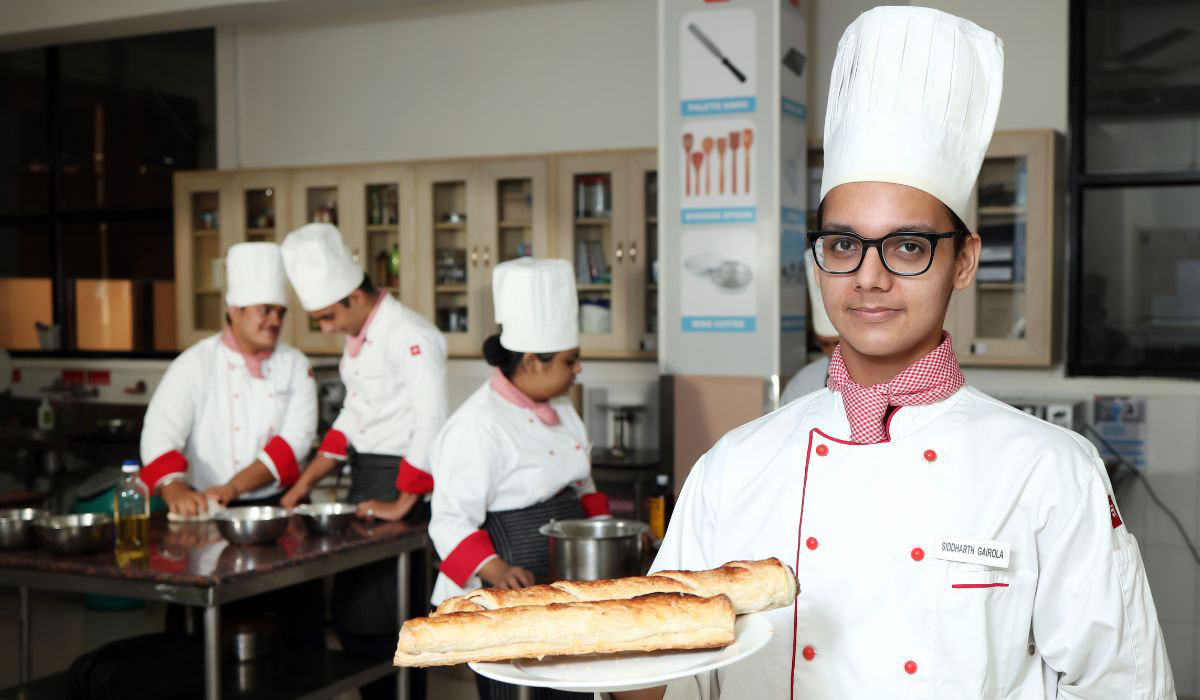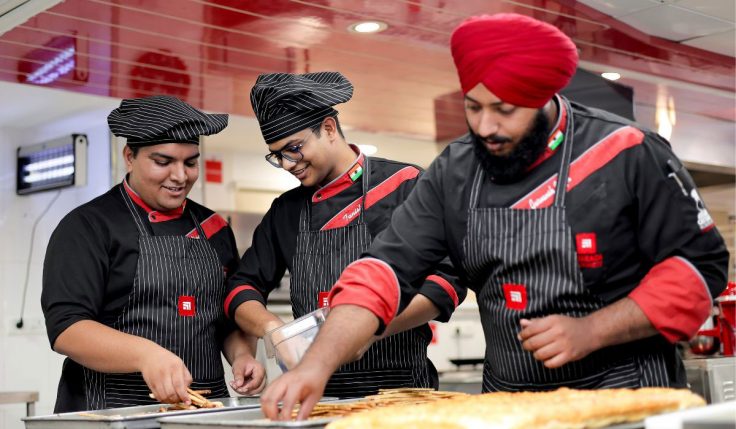Sustainability presents a universal challenge that all industries must actively address, including the bakery and pastry arts. It is imperative to adopt eco-friendly practices, emphasising streamlined resource planning.
Incorporating sustainable methods in bakery and pastry arts involves utilising organic, locally sourced ingredients to minimise environmental impact and reduce fossil fuel consumption. Additionally, employing recyclable packaging and implementing stringent quality control measures can further mitigate waste.
For those aspiring to transform their passion for culinary arts into a thriving career, specialised training in bakery and pastry art management is essential. The B.Sc. in Bakery and Pastry Arts curriculum is specifically designed to impart sustainable practices, equipping students with the skills needed for success in the industry.
In this blog, we will explore how programs like the B.Sc. in Bakery and Pastry Arts can pave the way for individuals to excel as bakers and pastry artists.
B.Sc in Bakery and Pastry Arts
The culinary arts program offers a specialisation in Bakery and Pastry Arts, aiming to train ambitious entrepreneurs in these fields by leveraging the foundational curriculum of culinary arts. Upon pursuing this program, you will find yourself immersed in a learning environment designed to foster creativity and ignite your entrepreneurial drive.
Through this program, you will master the fundamentals of bakery and pastry arts, refining your palate and senses through the exploration of various techniques, ingredients, and styles. The B.Sc. in Bakery and Pastry Arts at Chitkara University provides practical courses such as Baking Technology, Food Styling and Photography, the Basics of Packaging Design, Baking Ingredient Studies, Food Product Development, Operations Management, Accounting, Pastry, and Artisan Bread Making.
Moreover, the esteemed faculty at Chitkara University brings a wealth of academic and professional experience to the table, ensuring students are acquainted with the latest advancements in the Bakery and Pastry industry.
Program Highlights of B.Sc in Bakery and Pastry Arts
The B.Sc. program in Bakery and Pastry Arts is designed for aspiring entrepreneurs and pastry chefs. Over the course of three years, students undergo training to acquire the knowledge, skills, and management competencies necessary for success in the international pastry industry. The teaching approach is experiential and interactive, providing students with both strategic and operational insights into the industry.
Ideal Career Kickstart: This program equips you with comprehensive knowledge, skills, and management competencies essential for thriving in the global bakery and pastry industry. Additionally, the courses offer valuable hands-on experience through internships with leading brands worldwide.
Study Smart, Work Hard: The curriculum prepares you for a business-focused culinary degree, balancing practical kitchen experience with theoretical classroom learning. With over 1000 kitchen hours distributed throughout the year, along with two internships and various projects and workshops, you’ll dive deep into every aspect of the field.
Enhanced Employability: Benefit from the expertise of highly trained and experienced faculty members, as well as opportunities to interact with celebrity bakers and international patissiers. Engage in Master Classes, Workshops, and Guest Lectures led by prominent figures in the bakery industry, providing you with valuable exposure to contemporary trends and practices.
Sustainable Practices Taught In B.Sc in Bakery and Pastry Arts
Using Eco-Friendly Packaging: The course emphasises the importance of utilising recycled packaging materials that leave a minimal environmental footprint. Students learn the significance of phasing out standard paper packaging, which relies on trees that take years to grow. In contrast, recycled packaging either repurposes materials from previous packaging or utilises plant-based materials that regenerate quickly and require less energy to produce.
Avoiding Single-Use Plastics: he baking process often involves the use of numerous single-use plastics, such as disposable gloves and baking paper. Over time, these items accumulate and significantly increase their environmental impact. Therefore, students pursuing a B.Sc. in Bakery and Pastry Arts are instructed on the importance of transitioning to reusable products or biodegradable alternatives. These options enable the completion of tasks while maintaining safety and cleanliness with minimal environmental repercussions.
Minimizing Waste: Another strategy to reduce the environmental impact of sustainable bakeries is by minimising and managing food waste. Improving quality control helps reduce the number of unusable products that are discarded. Students learn to offer smaller portion sizes to customers, thereby reducing excess food disposal. Additionally, they are educated on alternative options, such as donating leftover and unsold foods to schools, homeless shelters, and charities before spoilage occurs. Furthermore, repurposing unsold food is encouraged.
Sustainably Sourcing Ingredients: The program emphasises sourcing ingredients that consider the social, ethical, and environmental impacts of suppliers. Factors such as ethical work practices, sustainably sourced materials, and a company’s environmental footprint are taken into account. Students are taught to procure ingredients and supplies locally to support the community’s economy. Furthermore, they learn how businesses can assess and adjust their practices to align with sustainability goals.
Incorporating Organic Ingredients: Plant-based ingredients are gaining popularity due to their health benefits and positive environmental impact. The B.Sc. in Bakery and Pastry Arts program teaches sustainability practices, such as substituting traditional ingredients with plant-based alternatives. This approach accommodates individuals with specific dietary restrictions while promoting environmental stewardship.
Reducing Water Usage: Bakeries typically consume significant amounts of water for baking and cleaning, much of which is unnecessary. The reduction of water usage begins with addressing small actions that collectively result in waste. For example, bakers can adopt practices such as clearing spills without water and utilising tools with lower gallon-per-minute nozzles during sanitation to minimise waste.
Also, read this blog post: Discover 7 Exciting Job Opportunities for Baking & Pastry Arts Grads
Sustainability has taken center stage in businesses in recent years as more people recognise the full impact of unsustainable practices on present and future generations. These practices offer numerous benefits, including energy conservation, fostering a healthier environment, caring for the planet, and enhancing people’s health.
If you aspire to forge a career in the field of bakery and pastry arts, it’s crucial to embrace sustainable practices. Enrolling in a program such as the B.Sc. in Bakery and Pastry Arts at Chitkara University can provide you with the knowledge and skills needed to incorporate sustainability into your craft. Reach out today to learn more.






